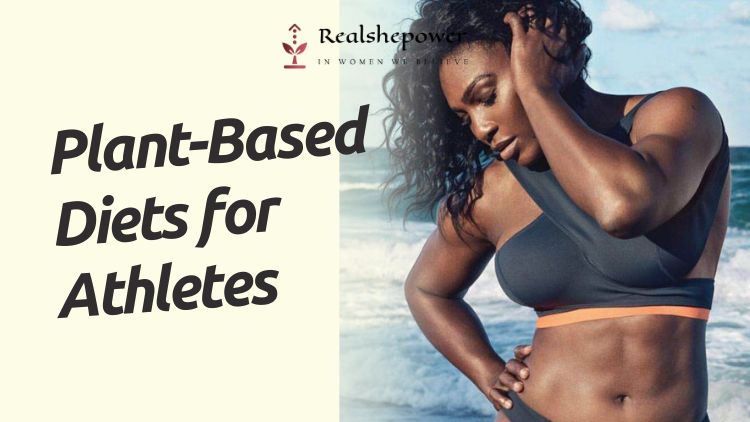Why Athletes Are Turning to Plant-Based Diets for Optimal Performance


Athletes are always looking for ways to improve their performance, and many are finding that plant-based diets can give them the edge they need. In recent years, a growing number of athletes have adopted plant-based diets, citing benefits such as improved energy, faster recovery, and better overall health. In this article, we’ll explore why athletes are turning to plant-based diets, and what the research says about the benefits of this approach.
Table of Contents
What is a plant-based diet?
First, it’s important to define what we mean by a plant-based diet. A plant-based diet is one that emphasizes whole, plant-based foods such as fruits, vegetables, whole grains, legumes, nuts, and seeds, while minimizing or eliminating animal products such as meat, dairy, and eggs. Some athletes choose to follow a vegan or vegetarian diet, which excludes all animal products, while others may include small amounts of animal products such as fish or eggs.
Why are athletes turning to plant-based diets?
There are several reasons why athletes are turning to plant-based diets:
- Improved energy and endurance: Plant-based diets are typically higher in carbohydrates, which are the body’s primary source of energy. This can be especially beneficial for endurance athletes who need sustained energy over a long period of time.
- Faster recovery: Plant-based diets are rich in antioxidants and anti-inflammatory compounds, which can help to reduce inflammation and promote faster recovery after exercise.
- Reduced risk of chronic disease: Plant-based diets have been linked to a reduced risk of chronic diseases such as heart disease, diabetes, and certain cancers. By eating a diet rich in plant-based foods, athletes can support their overall health and reduce their risk of long-term health problems.
What does the research say?
There is a growing body of research that supports the use of plant-based diets for athletic performance. For example, a 2018 review of studies found that plant-based diets can be beneficial for athletes in terms of improving cardiovascular health, reducing inflammation, and promoting faster recovery. Another study published in the journal Nutrients found that a plant-based diet can improve athletic performance in endurance athletes.
What are some examples of plant-based diets for athletes?
There are many ways to follow a plant-based diet as an athlete, and it’s important to work with a qualified nutritionist to ensure that you are getting all of the nutrients you need for optimal performance. Some examples of plant-based diets for athletes include:
- Vegan diet: A vegan diet excludes all animal products and focuses on whole, plant-based foods such as fruits, vegetables, whole grains, legumes, nuts, and seeds.
- Vegetarian diet: A vegetarian diet excludes meat but may include some animal products such as dairy and eggs.
- Flexitarian diet: A flexitarian diet includes mostly plant-based foods but may include small amounts of animal products.
5 Interesting facts
- Several high-profile athletes, including Serena Williams, Lewis Hamilton, and Novak Djokovic, have adopted plant-based diets for improved athletic performance.
- According to a report by research firm GlobalData, the number of people identifying as vegan increased by 600% in the United States between 2014 and 2017.
- The protein content of many plant-based foods is higher than many people realize. For example, a cup of cooked lentils contains about 18 grams of protein, while a cup of cooked quinoa contains about 8 grams of protein.
- Plant-based diets have been shown to improve gut health by increasing the diversity of gut microbiota, which can lead to better digestion and absorption of nutrients.
- One study found that a plant-based diet can reduce oxidative stress and inflammation, which can help to speed up recovery time after exercise.
Answering some of your most asked questions
Q: Can athletes get enough protein on a plant-based diet?
A: Yes, there are many plant-based sources of protein, including beans, lentils, tofu, tempeh, nuts, and seeds. Many plant-based athletes also use protein powders made from pea, rice, or hemp protein to supplement their diets.
Q: Will a plant-based diet provide enough energy for athletic performance?
A: Yes, a well-planned plant-based diet can provide all the necessary energy and nutrients for athletic performance. Plant-based foods are often high in complex carbohydrates, which provide sustained energy for exercise.
Q: Can a plant-based diet improve recovery time after exercise?
A: Yes, some studies have shown that plant-based diets can reduce inflammation and oxidative stress, which can speed up recovery time after exercise.
Q: Is it difficult to meet nutrient needs on a plant-based diet?
A: No, a well-planned plant-based diet can provide all the necessary nutrients for optimal health and athletic performance. However, it may require some additional planning and attention to ensure that nutrient needs are being met.
Q: Do plant-based diets offer any other benefits for athletes?
A: Yes, plant-based diets have been shown to improve cardiovascular health, reduce inflammation, and improve gut health, which can all contribute to better athletic performance.
In conclusion, plant-based diets are becoming increasingly popular among athletes, and for good reason. By focusing on whole, plant-based foods, athletes can improve their energy and endurance, promote faster recovery, and reduce their risk of chronic disease. If you’re an athlete interested in exploring plant-based diets, be sure to work with a qualified nutritionist to ensure that you are getting all of the nutrients you need for optimal performance.
10 Vegan celebs around the world

Veganism means completely banishing the consumption of animal products such as milk, meat, wool, etc. Vegan people promote the usage of items that emerged out of plants. Besides food, vegans may
Top 5 health benefits of a vegetarian diet

A balanced vegetarian diet is one that includes enough fiber, vitamins C and E, folic acid, magnesium, unsaturated fat, and a wide variety of phytochemicals. And this explains why vegetarians have lower
Problems faced by Women Athletes in India

Sports play a vital role in maintaining our overall health and well-being. While sports help in maintaining and improving both the physical abilities and skills for the participants, it also works on the entertainment
You can now write for RealShePower and be a part of the community. Share your stories and opinions with us here.
